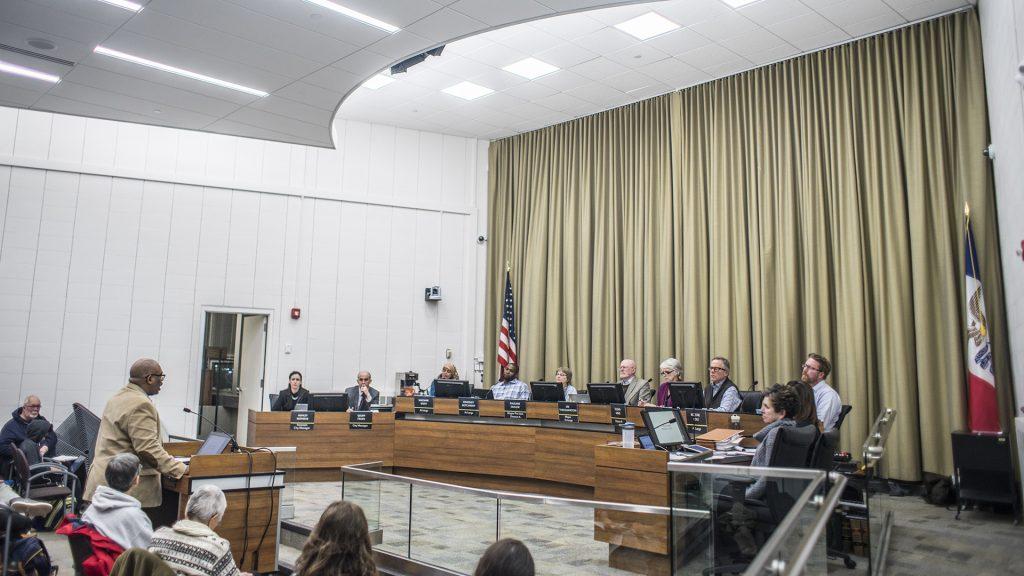By Allison Meyer
A new city ordinance will require some landlords’ properties to be subject to city inspections twice as often.
The City Council passed an ordinance requiring higher-occupancy rental properties to be inspected annually on May 29. Councilors approved the ordinance 6-0 as part of the consent agenda, and the policy is set to go into effect starting on July 1.
Prior to the ordinance, rental units were required to be inspected every two years. Yearly inspections are now required in higher-occupancy rental properties, including multifamily units built before 1996, single-family and duplex units with more than four bedrooms, and other larger properties, including fraternity and sorority houses, group homes, and rooming houses.
In a memo to the council from Neighborhood and Development staff members, they said the affected properties are primarily student housing, located downtown and in the surrounding area.
The change comes as part of a series of efforts that the city has enacted since Iowa Legislature passed a bill last year outlawing cities from regulating the occupancy of rental properties based on familial status. Before the bill, HF 134, was passed, Iowa City allowed rental properties to house a family and one roomer, or three unrelated people.
City Senior Housing Inspector Stan Laverman said occupancy is now based on square footage of bedrooms and parking that is provided at the property.
The resolution passed with the safety of tenants in mind, along with allowing the city to better enforce new regulations on rental properties. Without proper enforcement of the regulations, the desired outcome to improve rental-property conditions will be difficult to achieve.
“The increased inspections are designed to put our eyes on higher-occupancy properties on a more frequent basis,” Laverman said. “Older multifamily units are where we get the most complaints that things are not taken care of, that safety items are not in place, so it’s a proactive response to this issue.”
However, more frequent inspections will also come at a cost to the owners of the rental properties. Rental-permit inspections do not have a cost, but the fee is instead tied in with the cost of a rental permit. With the new ordinance, rental-permit fees will be imposed every year instead of every two years on the affected properties.
The additional fees will generate revenue for the city; officials intend that the revenue be used to bring on an additional inspector to help adjust to the increase in workload for the Housing Inspection Services. The department will also hire a full-time employee who will deal specifically with nuisance complaints in residential areas.
RELATED: City Council passes new housing ordinance
Chris Lehman, an owner of downtown rental properties, was optimistic about the effects of the policy.
“You have to have the permit, which is a fee. But if you have an inspection, and everything passes, then it’s no additional cost to you,” he said. “What will cost you money is getting repairs made to bring everything up to code, and that’s just all about safety for the tenants. I think it’s good for the safety of the tenants.”
The ordinance also pertains to the rental cap that the City Council passed earlier this year. Property owners are allowed to keep and renew their rental permits, even if the rental percentages in the neighborhood are above the cap of 30 percent. More frequent inspections put more pressure on landlords to keep their properties up to code so as not to lose their rental permits and risk not being able to get them back.
Increasing the frequency of inspections promotes a stricter adherence to rules and regulations. However, incurring the additional costs for rental owners has the potential to ultimately affect rents.
In the memo, city staff members acknowledged that additional enforcement does come at a cost; however, they believe that “a balance has been struck between the concerns of protecting affordable housing from increased regulatory cost and the need for increased enforcement to protect our neighborhoods.”
Simon Andrew, the assistant to the city manager, said a large part of implementing and enforcing the new ordinances is education.
“It’s about making sure that everybody knows what the impetus for the change was, why we’re moving in this direction, and really just making sure people know what to expect,” he said.



